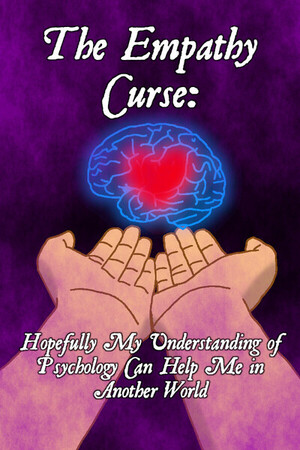Chapter 18:
Priming
The Empathy Curse: Hopefully My Understanding of Psychology Can Help Me in Another World
Memories might not be accurate, but the grand narrative they shape has immense power over their owner. Not individual fragments of images, but an interconnected network of mist that shifts and transforms like a weathered statue under rain, held together by overarching skeletons we call identity or belief. When a memory catches a detail in the present that it recognizes, it makes itself known to you, hoping you can make use of its wisdom. Whether you want to remember those traces of the past is none of their concern. The role they have taken is that of a Polaroid photo smeared by raindrops, but still vowing to follow you to the ends of the earth, until their very bodies disintegrate.
My memories were the same, loyal subjects that did what they thought was best for their master, even when their master wouldn’t agree that what they did was beneficial. The time when I cried in Lyla’s embrace, it made my current inadequacy painfully obvious to me; and my incompetence at doing what Lyla and most people could do, to provide skillful words that would stimulate another’s primal social center, signaling to her that everything would be alright. That she was treasured. That she was loved. That she was valued.
All I could provide was bitter silence. Sunk in my own misery. There was an older memory that surfaced only now. It took place deep in my past life, one that I preferred to forget. Not because it was traumatic, no, humans love past misery and present self-pity. It was the opposite, and the natural enemy of the human mind, an anomaly one couldn’t understand and could only throw away into the corner of consciousness.
It took place in the first year of my PhD journey. The initial plan for data collection failed. The trial run of my experimental design resulted in a miserable fiasco. I spent a few late nights at the lab, racking my brain for a solution. With so much caffeine in my system that my mind was only submerged in stimulation, and garbled ideas bounced in my skull, never settling into full-fledged solutions.
I didn’t know which night it was, but I gained an unexpected companion for a few fleeting hours. The workday ended with the professor and my other colleagues leaving the office, and I expected the long night to be the same as any other.
Then, to my complete surprise, the professor returned with a pack of sparkling water and a takeout box. The gleam on his glasses made it difficult to see and read his expression. It didn’t matter; I didn’t want to understand the culprit that had caused much of my later suffering, the villain of my story.
“You haven’t eaten dinner yet. See if this matches your taste. If not, I’ll throw it away.” What a wasteful person. Needless to say, I was forced to accept his obnoxious goodwill.
“You don’t have to pay me back.” He said. The condescending tone was getting on my nerves, especially in my caffeine-driven, irritated state. I protested in silence, not thanking him for this arrogant pretense.
We didn’t speak about anything, accompanied only by the sounds of typing from our laptops. It was a unique tranquility we shared only on that anomalous night, in the dim office illuminated only by the screens. Inside, I couldn’t focus, and it must have been because of his presence, paranoid guesses of his intentions. There wasn’t a reason for him to stay the night, unless it was to monitor my progress, to intimidate me, or, a more terrifying possibility, he could be after my body.
Those uncomfortable inferences soon burned out like an almost-done candle. And I could concentrate back on work, feeling more efficient than before. Maybe I wanted to complete my work so the professor couldn’t have an excuse to breathe down my neck again.
Under the deep hum of the air-conditioning, we continued this standstill until the time was approaching midnight. The professor broke the silence by slamming his laptop shut. “Do you plan to sleep tonight?”
I knew it! He is after my body! Even in my dazed, fatigued state, I mustered my remaining strength to shift my chair to the corner. He was shorter than me, so I would have had a good chance of winning if I hadn’t lost all my energy from working. Lucky for me, a fight wasn’t necessary; he willingly retreated to his office desk.
He lay his face on the desk, altering his pose to find one most comfortable to sleep in. Once he settled on one, he sank his weight onto the desk. It was uncanny to watch your boss relaxing as if this were his bedroom. This annoying distraction pried me away from my work.
From the moment he infringed on the after-hours that should have been uniquely mine, the stress and resentment would inevitably build up to an outburst. With the excuse set, my brain permitted my voice to unleash its fury.
“I can’t do this anymore. My months of preparation went down the drain. I can’t graduate like this. Nothing can save my project. It’s over.” Not caring a bit about professional boundaries, I poured out my gripes to the person who wasn’t obligated to listen. He didn’t reprimand me for dumping my emotions on him, and not a single word of complaint drifted from his mouth.
I might have shared my entire life story with him, though only a small part of what I said remained recognizable in my memory. His response, on the contrary, was forever accessible in my memory, disregarding how much I want it gone: “Try to get over one day at a time. Try to be better than yesterday.”
It wasn’t because of him that I could bounce back from failure. That must have been a false memory, something generated by my mind to act as a contrarian to my regular vilification. If his words really had that much of an impact on me, what would it say about my useless response to Lyla’s despair?
The dead air that permeated Lyla’s room after her heartfelt disclosure carried on. Soon, I was convinced that she had fallen asleep. I didn’t confirm it with my own eyes; seeing her tears would have broken me completely. Gently calling her name and leaving the room when there wasn’t a response, that was the extent of my cowardice.
Back in my room, ruminations had kept me awake for most of the night. A fragmentary insomnia tormented me. It had the false mercy of letting me have the minimum of sleep; it was riddled with nightmares of people crying, some of them people from my past life that I barely remembered, others were blank-faced individuals I didn’t recognize, none of them Lyla. The result was the same powerless struggle. No matter what I did or said, they ignored me, continuing their swim in misery.
I had woken up a few times in the night in a cold sweat. Disorientation of who I was would dig into me for a few seconds. Even as my identity returned to my consciousness, another wave of afflictions would have its turn on me. Knowledge of the name of my condition, parasomnia, did nothing to ease it. Moreover, I was bombarded with dread from the forecasts of the consequences of poor sleep quality; dysfunctions range from memory to judgment. How I wished mental health problems were merely evil spirits like my ancestors believed; then, invoking their name might have some effect. What was the point of learning psychology when all I could say to a suffering person was a stupid anecdotal tale?
Eye contact with Lyla was difficult the day after. Since we lived and worked together, avoiding her entirely was impossible. Still, I kept my distance from her. Lyla seemed to want to bring it up, but every time I changed the topic before she could ask. My efforts to divert conversations were so obvious that even Coyote noticed in our brief time eating lunch together.
“Did you two have a fight?” She said.
“No, it’s only a problem that adults have,” I said.
“I’m older than you…” The pout on her face gave me a reason to smile, but it lowered my guard, giving me a slight glimpse at Lyla’s sharp frown. And it sapped my momentary joy. A clear reminder that her problem wasn’t resolved, she was still miles away from her lifelong goal. Undeniably, the responsibility for her agony lay partly on me, because I was one of those who made fun of her archery.
This gloomy atmosphere lingered for a few days. In an effort to improve my sleep quality, I spent more time outside soaking up the scenery of the city. Those excursions would improve my mood momentarily, but once I returned to the store, the reality of my ineptitude set back in.
The lady I met the other day, I became convinced in my stray thoughts that she could help me with my vicious cycle. She would understand my pain. I kept my eyes open for traces of her, but my imaginary savior was nowhere to be seen. I asked the patrolling soldiers and learned that no one besides me had met her, leading me to question whether she was only my hallucination, a manifestation of my loneliness. Thoughts in my head tried to persuade me to expand my search to the back streets, and it took all my reasoning to resist the drive to give up my safety to plunge into false hope.




Please sign in to leave a comment.